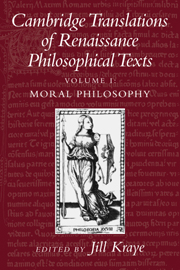Book contents
- Frontmatter
- Contents
- List of Translators
- Preface
- PART I CONCEPTS OF MAN
- PART II ARISTOTELIAN ETHICS AND THE SUPREME GOOD
- PART III ARISTOTELIAN ETHICS AND CHRISTIANITY
- PART IV PLATONIC ETHICS
- 12 Cardinal Bessarion
- 13 Marsilio Ficino
- 14 Francesco Cattani da Diacceto
- 15 Francesco de' Vieri
- PART V STOIC ETHICS
- PART VI EPICUREAN ETHICS
- Bibliography of Renaissance Moral Philosophy Texts Available in English
- Index Nominum
- Index Rerum
12 - Cardinal Bessarion
Published online by Cambridge University Press: 05 June 2012
- Frontmatter
- Contents
- List of Translators
- Preface
- PART I CONCEPTS OF MAN
- PART II ARISTOTELIAN ETHICS AND THE SUPREME GOOD
- PART III ARISTOTELIAN ETHICS AND CHRISTIANITY
- PART IV PLATONIC ETHICS
- 12 Cardinal Bessarion
- 13 Marsilio Ficino
- 14 Francesco Cattani da Diacceto
- 15 Francesco de' Vieri
- PART V STOIC ETHICS
- PART VI EPICUREAN ETHICS
- Bibliography of Renaissance Moral Philosophy Texts Available in English
- Index Nominum
- Index Rerum
Summary
Introduction
Bessarion (c. 1403/8–72) was born in Trebizond and educated in Constantinople. Entering the Order of St Basil in 1423, he was ordained a priest in 1431. His philosophical training culminated in his study of Platonism in Mistra under the guidance of George Gemistos Plethon, who was to become notorious when his treatise The Laws was posthumously revealed to contain blatantly pagan material. After becoming archbishop of Nicaea in 1437, Bessarion attended the Council of Ferrara/Florence (1438–43), where he was one of the key Byzantine supporters of union of the Greek and Latin churches. Created a cardinal of the Catholic Church in 1439, he took up residence at the papal court in Florence in 1440, subsequently moving with the Curia to Rome in 1443. He became a highly influential member of the Curia and was several times nearly elected pope. He was actively engaged in papal diplomacy and became patriarch of Constantinople in 1463, a decade after the fall of the city to the Turks. His magnificent collection of Greek manuscripts was bequeathed to Venice, where – after decades of neglect – it formed the core of the Marciana Library.
Against the Slanderer of Plato, written in Greek by Bessarion but published in Latin translation (1469), was a reply to the Comparison of Plato and Aristotle (1458) of George of Trebizond (1396–c. 1472).
- Type
- Chapter
- Information
- Cambridge Translations of Renaissance Philosophical TextsMoral and Political Philosophy, pp. 133 - 146Publisher: Cambridge University PressPrint publication year: 1997



